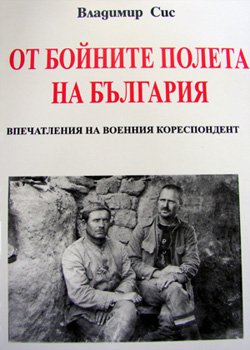
© Photo: Veneta Pavlova
Some 100 years ago a book, entitled “From Bulgarian Battlefields” was published in Prague. The book collects the reports by Czech journalist Vladimir Sis from the Balkan war (1912-1913). Vladimir Sis was just 23-years-old when he began sending his reports as a correspondent for the Narodni Listy newspaper in Prague. The book is published for the first time in Bulgaria. One of the consultants for the Bulgarian edition was Colonel Dimitar Zafirov from the Georgi Sava Rakovski military academy. Here is what he told Radio Bulgaria:
“He is a Slavophile, a Bulgarophile and a very good journalist. He traveled across Europe and when he came to Bulgaria he created a number of connections with the royal court here and the military elite. That is how he was granted such access to the events of the Balkan War that no other foreign reporter had at the time. In his book he presents a realistic picture from the first period of the Bulgarian participation in the Balkan War. He also deals with the Serbian actions and pays attention to the battles on the western frontline. However, he focuses mostly on the battlefields in the region of Eastern Thrace where mostly Bulgarian forces operated.”

© Photo: wikipedia.org
In his reports Vladimir Sis tells about the atmosphere before the war and the mobilization. He writes also about the battles near Lozengrad, Catalca, Bunarhisar and others. While other reporters were receiving censured information from the military he was allowed to be at the frontline. After the victory in Lule Burgas, Sis asked an officer about the heroism of Bulgarian soldiers. “It is all due to the selflessness, courage and intelligence of the Bulgarian soldier. Even when all officers of a battalion were killed, not a single soldier thought of retreat,” the officer answered. In cases like this command was taken by the highest military rank or when there is no one with a higher rank, by the most experienced soldiers.
The personal example and great courage shown by Bulgarian officers during the war also had an incredible effect on the soldiers. “Officers lived in the same conditions as the ordinary soldiers,” reporter Vladimir Sis writes.
English version: Alexander Markov
Archaeologists have explored a necropolis in the Kavatsi area near Sozopol. The perimeter in which it is located is part of the history of Apollonia Pontica and is dated to the 4th century BC. "This is a site with interesting burials in which a nuance..
On November 10, 1989, at a plenum of the Central Committee of the Bulgarian Communist Party, Todor Zhivkov was removed from the position of General Secretary - the highest position in the party and the state. What happened at the..
Archaeologists have discovered a very rare and valuable glass bottle in a 2nd-century tomb in the southern necropolis of the Roman colony Deultum near the village of Debelt (Southeastern Bulgaria). What makes it unique is that it depicts the myth of..

+359 2 9336 661
